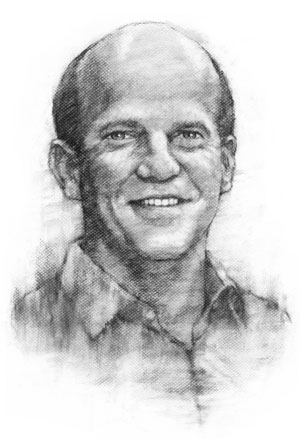Talking points
After one of the company’s most successful seasons, Court Theatre Artistic Director Charles Newell refuses to play it safe.
By Jason Kelly
Illustration by Allan Burch

Name: Charles Newell
Title: Artistic Director, Court Theatre
Previous posts: Resident director, Guthrie Theater, Minneapolis; staff repertory director, John Houseman’s The Acting Company, New York. Joined Court in 1994.
Beyond the stage: Court Theatre’s work is not merely the five plays that we produce every year. The productions are a catalyst for a larger conversation, part of a series of platforms on which our work operates. Those platforms include our stage and also the classroom, the research library, the neighborhood artistic and cultural connections. It’s no longer just about the artistic impulse; it’s about creating a center in which an artistic impulse and the academic, intellectual resources are melded together to make something more than they are independently. This is about making art and scholarship and how those two things feed each other.
The classics: For six or seven years, Court’s board, the University, and I have had a vision of Court being a center for classic theater. That’s been a very inspiring and exciting idea for us, but it also comes with challenges: What does that really mean? How do we do that? What are the first steps? In the last year, we’ve gotten that kind of leadership through [new executive director Stephen J. Albert’s] efforts. … We’ve begun a season-planning process that thinks much more rigorously from the very beginning about the specific connections within the intellectual resources of the University that the production can tie into, be informed by, and inform.
Visible collaboration: For many years I was interested in doing a stage adaptation of Ralph Ellison’s Invisible Man, but we were denied the rights by the Ellison estate. In 2009 the estate granted the rights to a team working out of New York City based at a theater company that I admire a lot. They called us up and said, “Hey, are you interested in this?” We have here at the University [Fairfax M. Cone distinguished service professor of English language and literature] Ken Warren, who is an Ellison expert. Because of Court’s artistic reputation, and because of Ken being at the University, an opportunity was generated. We are now working together with Ken toward bringing this adaptation to the stage.
Well seasoned: Going into [the 2009–10] season, all of us at Court were very concerned because, given the economic challenges, we had cut our production budget by over 25 percent—primarily through smaller casts and lots of other belt-tightening. We had one show with one actor, and we had two shows with two actors. We had three shows with a total cast of five, which is outrageous. Then to be recognized with a record-breaking 18 [Jeff Award] nominations was a mind-blowingly fabulous affirmation. Court Theatre had three of the six nominations for best production [but did not win in that category], so in a sense we were competing against ourselves. Also, I like to think that because Mary Beth Fischer in Year of Magical Thinking won for best solo performance, in some ways we did win a best-production award because it was all about her.
Top that: The success of last season only provokes me, as an artistic leader and as an individual artist, to ask, “What’s the next challenge? What’s the next thing that seems so fabulous and yet terrifyingly risky? What is that project that we need to challenge ourselves on?” Almost without exception the shows that have been the most artistically risk taking, and therefore terrifying, have been the most artistically and financially successful.
Necessarily so: Needless to say Porgy and Bess [opening May 12] is a perfect example of that risk taking. First of all, to take on such a massively large landscape of storytelling with 14 actors is going to be a real challenge, and then to put a piece so often thought of on the grand scale in our intimate room of 250 seats. You add to that, of course, that throughout its history Porgy and Bess has had a very controversial reception. So we knew going in that the scale of it and the authenticity of its portrayal were going to be a massive challenge. I’m terrified, and therefore I know we’re in a good place. My terror gives me comfort.
Return to top
